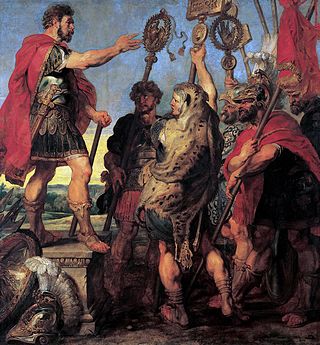Related Research Articles
During the 290s BC, Hellenistic civilization begins its emergence throughout the successor states of the former Argead Macedonian Empire of Alexander the Great, resulting in the diffusion of Greek culture throughout the Levant and advances in science, mathematics, philosophy, etc. Meanwhile, the Roman Republic is embroiled in war against the Samnites, the Mauryan Empire continues to thrive in Ancient India, and the Kingdom of Qin in Ancient China, the one which in the future will conquer its adversaries and unite China, begins to emerge as a significant power during the Warring States period.
Year 296 BC was a year of the pre-Julian Roman calendar. At the time it was known as the Year of the Consulship of Violens and Caecus. The denomination 296 BC for this year has been used since the early medieval period, when the Anno Domini calendar era became the prevalent method in Europe for naming years.
Year 295 BC was a year of the pre-Julian Roman calendar. It was known in the Roman Republic as the Year of the Consulship of Rullianus and Mus. The denomination 295 BC for this year has been used since the early medieval period, when the Anno Domini calendar era became the prevalent method in Europe for naming years.

The First, Second, and Third Samnite Wars were fought between the Roman Republic and the Samnites, who lived on a stretch of the Apennine Mountains south of Rome and north of the Lucanian tribe.

The gens Claudia, sometimes written Clodia, was one of the most prominent patrician houses at ancient Rome. The gens traced its origin to the earliest days of the Roman Republic. The first of the Claudii to obtain the consulship was Appius Claudius Sabinus Regillensis, in 495 BC, and from that time its members frequently held the highest offices of the state, both under the Republic and in imperial times.

Lucius Cornelius Scipio Barbatus was one of the two elected Roman consuls in 298 BC. He led the Roman army to victory against the Etruscans near Volterra. A member of the noble Roman family of Scipiones, he was the father of Lucius Cornelius Scipio and Gnaeus Cornelius Scipio Asina and great-grandfather of Scipio Africanus.
Quintus Fabius Maximus Rullianus was a patrician, politician and soldier of the Roman Republic during the fourth and early third century BC. He was the son of Marcus Fabius Ambustus, of the patrician Fabii, was five times consul, dictator once, censor, and a hero of the Samnite Wars. He was brother to Marcus Fabius Ambustus, who was named after their father, and the grandfather of Quintus Fabius Maximus Verrucosus.
The Battle of Sentinum was the decisive battle of the Third Samnite War, fought in 295 BC near Sentinum, in which the Romans overcame a formidable coalition of Samnites, Etruscans, and Umbrians and Senone Gauls. The Romans won a decisive victory that broke up the tribal coalition and paved the way for the Romans' complete victory over the Samnites. The Romans involved in the battle of Sentinum were commanded by consuls Publius Decius Mus and Quintus Fabius Maximus Rullianus.

Lucius Papirius Cursor was a celebrated politician and general of the early Roman Republic, who was five times consul, three times magister equitum, and twice dictator. He was the most important Roman commander during the Second Samnite War, during which he received three triumphs.

Lucius Minucius Esquilinus Augurinus was a Roman politician who was consul in 458 BC and decemvir in 450 BC.
Appius Claudius Crassus InregillensisSabinus was a Roman senator during the early Republic, most notable as the leading member of the ten-man board which drew up the Twelve Tables of Roman law around 451 BC. He is also probably identical with the Appius Claudius who was consul in 471 BC.

Publius Decius Mus, of the plebeian gens Decia, was a Roman consul in the years 312 BC, 308 BC, 297 BC and 295 BC. He was a member of a family that was renowned for sacrificing themselves on the battlefield for Rome.
Gellius Egnatius was the leader of the Varriani, a leading clan of the Samnites during the Third Samnite War, which broke out in 298 BC. By the end of the second campaign the Samnites appeared completely defeated, however in the following year Gellius Egnatius marched into Etruria, and roused the Etruscans to a close co-operation against Rome. This had the effect of withdrawing Roman troops from Samnium for a period of time; but the forces of the confederates were defeated by the combined armies of consuls Lucius Volumnius Flamma Violens and Appius Claudius Caecus.

Verginia, sometimes spelled Virginia, was the daughter of Aulus Verginius, a Roman patrician. Her example of modesty and virtue in the face of adversity became famous in antiquity, and during the Middle Ages, she was celebrated as one of Boccaccio's Famous Women.
The Battle of Tifernum was an important battle of the Third Samnite War, fought in 297 BC near Castropignano, either on the banks of the river Biferno or near the Matese mountains in the province of Campobasso, in what is now southern Italy, where the Romans overcame a determined Samnite army. The result would lead to the decisive Battle of Sentinum, which granted Rome the domination of central Italy.
The gens Verginia or Virginia was a prominent family at ancient Rome, which from an early period was divided into patrician and plebeian branches. The gens was of great antiquity. It frequently filled the highest honors of the state during the early years of the Republic. The first of the family who obtained the consulship was Opiter Verginius Tricostus in 502 BC, the seventh year of the Republic. The plebeian members of the family were also numbered amongst the early tribunes of the people.
Gaius Junius Bubulcus Brutus was a Roman general and statesman, he was elected consul of the Roman Republic thrice, he was also appointed dictator or magister equitum thrice, and censor in 307 BC. In 311, he made a vow to the goddess Salus that he went on to fulfill, becoming the first plebeian to build a temple. The temple was one of the first dedicated to an abstract deity, and Junius was one of the first generals to vow a temple and then oversee its establishment through the construction and dedication process.
Gaius Julius Iullus was a Roman statesman, who held the consulship in 482 BC. After a contentious election, he was chosen to represent the more moderate faction in Roman politics, while his colleague, Quintus Fabius Vibulanus, was elected by the aristocratic party. Both consuls led a Roman army against Veii, but withdrew when the Veientes refused to confront them. Thirty years later, in 451, Julius was chosen a member of the first decemvirate, alongside several other ex-consuls and other respected statesmen. Julius proved himself a man of good judgment and integrity, and helped to draw up the first ten tables of Roman law.
Publius Sempronius Sophus was a Roman politician and general who achieved the honors of being both consul and censor in his political career, as well as renown for being a talented and well respected jurist.
According to Roman tradition, it was a Decemvirate that drew up the Twelve Tables of Roman law.
References
- 1 2 3 Kurt Raaflaub, ed., Social Struggles in Archaic Rome: New Perspectives on the Conflict of the Orders (University of California Press, 1986)
- ↑ Book review by John Briscoe in The Journal of Roman Studies, vol. 62 (1972), pp. 187–188
- ↑ Torelli, Mario, Studies in the Romanization of Italy, ed. and trans. Helena Fracchia and Maurizio Gualtieri (University of Alberta Press, 1995)
- ↑ Livy, 10. 16.1–2, 17
- ↑ Livy, 10.17
- ↑ Livy, 10.18–19
- ↑ Livy, 10.20–21
- 1 2 Boccaccio, Giovanni, Concerning Famous Women, translated by Guido A. Guarino (Rutgers University Press, 1963) pp. 137–138 (Library of Congress Catalogue Card Number 63-18945)
- ↑ Livy's History, Book X, 23